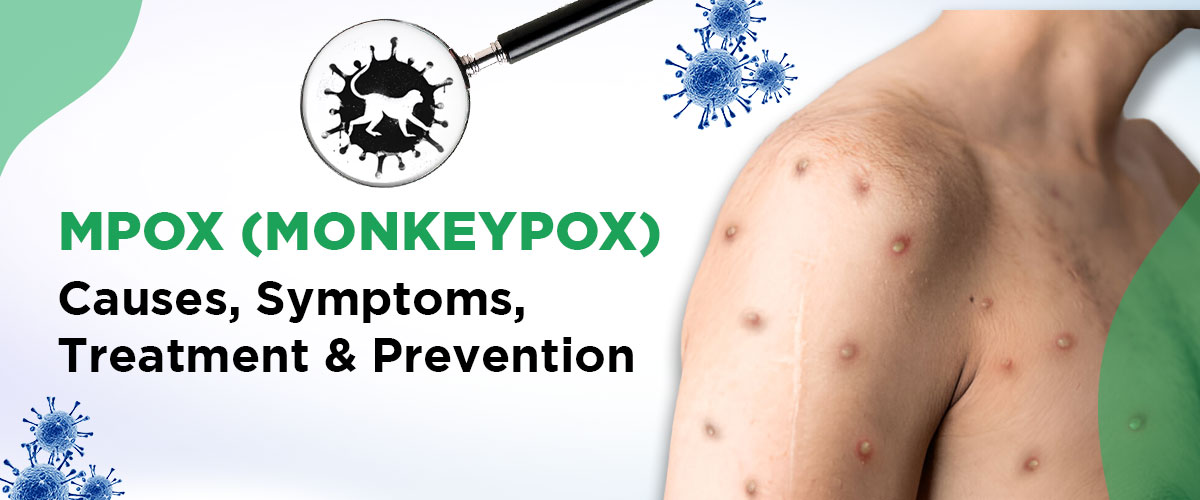
Subscribe to our

Craig, what the world has known in recent times as monkeypox, now referred to as Mpox, has emerged as a significant health concern due to its relationship with the more dangerous smallpox, despite being distinctly different in several ways. This viral zoonotic illness primarily affects Central and West African countries, but occasional cases have been reported globally, causing concern among public health practitioners.
Therefore, it is crucial to understand all aspects of Mpox, including its causes, symptoms, and methods of prevention. For those seeking medical attention, especially in such cases, it’s advisable to consult professionals at the Best General Physician Hospital in Noida to ensure proper diagnosis and care.
In case one develops symptoms similar to Mpox or if you have been in contact with the virus, it is advisable to visit the doctor. Call now at +91 9667064100.
Mpox is an extremely rare viral disease within the Orthopoxvirus group, the same family as smallpox originating from Africa. Mpx is less aggressive as compared to smallpox but clinically has similarities and therefore should be diagnosed and managed appropriately. The mode of transmission is zoonotic whereby the virus is transmitted from animals to humans although human to human transmission is obtained by contact with infected patients.
Mpox is an infectious disease, which is caused by the monkeypox virus and can be transmitted to humans by -
Transmission from Animals:
Signs and symptoms of Mpox start with flu-like symptoms, such as -
Flu-Like Symptoms:
Skin Lesions:
Lymphadenopathy:
If you're experiencing symptoms similar to Mpox or need dengue fever treatment, seeking timely medical attention is essential to ensure proper care and recovery.
Till present, there is no standard treatment available for this disease and it is referred to as Mpox. Though, use of smallpox vaccines, antiviral and vaccinia immune globulin (VIG) is available to contain the spread of the disease. No specific cure for the condition exists: management is palliative, and aims at the prevention of complications. From those recommendations, instructions for patients include, resting, drinking a lot of fluids, or using proper pain and viral fever treatment at Hospital in Noida. More severe cases however may call for hospitalization for a more intensive treatment.
To prevent Mpox, the following measures should be taken; The direct contact with animals considered to be carriers of the virus should be avoided, and good hygiene practices should be enhanced while safe food practices having stringent measures put in place. Hospital or other healthcare facility protocols should be observed in this context especially on issues related to standard infection control measures such as the PPE. Smallpox has been observed to have some relation to Mpox, and as a result, vaccination against smallpox may be used in people who are in high-risk groups.
1. Dr. Anshumala Sinha
Dr Sinha is qualified in internal medicine and diabetology with more than 20 years of practice; thus he has great prowess in treating various infectious diseases such as Mpox viral infections. This includes preventive health care measures alongside treatment that best suits the client.
2. Dr. Neelabh Pratap
Dr. Neelabh Pratap has worked for more than 6 years as a general physician, with specialization in Neuro infectious diseases, critical care management and trauma cases. This devotion has made him be among the leading names when it comes to handling viral diseases.
3. Dr. Sonakshi Saxena
Dr. Sonakshi Saxena has the experience of over 4+ years in the field of internal medicine and focuses on the importance of the patient. The fact that she handles fevers and infections makes her very important in the early diagnosis and management of Mpox.
Early detection and proper medical care can significantly reduce the severity of the disease and prevent complications. Call us on +91 9667064100.
Mpox is an extremely rare viral disease that should not be underestimated; appropriate attention and management are crucial to prevent its spread. Understanding this condition allows people to take preventive measures, as it’s important to recognize the causes, indicators, and methods of prevention. If you suspect you have been exposed to Mpox or are experiencing symptoms, consult with a healthcare provider immediately for guidance and care. Additionally, if you're dealing with similar concerns, such as chicken pox treatment, seeking prompt medical advice is essential to ensure proper management and recovery.
1. What is Mpox?
Mpox, or monkeypox, is a viral infection that is similar to smallpox but is generally less severe.
2. How is Mpox transmitted?
Mpox can be transmitted from animals to humans through direct contact and from human to human through respiratory droplets, bodily fluids, or contaminated objects.
3. What are the symptoms of Mpox?
Symptoms include fever, headache, muscle aches, fatigue, and a characteristic rash that progresses through several stages before healing.
4. Is there a vaccine for Mpox?
Smallpox vaccines can provide some protection against Mpox and may be recommended for those at high risk.
5. How long does Mpox last?
The illness typically lasts 2 to 4 weeks, with the rash taking time to progress through its stages.
6. Can Mpox be treated?
There is no specific treatment, but supportive care, including managing symptoms and preventing complications, is essential.
7. Who is at risk of Mpox?
Individuals in close contact with infected animals or people are at higher risk, as are those in regions where the virus is more common.
8. How can Mpox be prevented?
Prevention strategies include avoiding contact with potentially infected animals, practicing good hygiene, and using PPE in healthcare settings.
9. Is Mpox the same as smallpox?
No, while they are similar, Mpox is generally less severe than smallpox and is caused by a different virus.
10. What should I do if I think I have Mpox?
If you suspect you have Mpox, seek medical attention immediately for diagnosis and appropriate care.